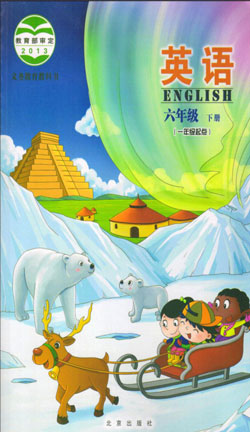UNIT THREE LET'S LIVE A LOW-CARBON LIFE课文句子跟读音频
Lesson 9
UNIT THREE LET'S LIVE A LOW-CARBON LIFE
第三单元 让我们过上低碳生活
Lesson 9
第九课
Listen and say
听一听,说一说
Mum, what's the date today?
妈妈,今天是几号?
It's April 22nd.
今天是4月22日。
It's World Earth Day.
世界地球日哦。
What's it for?
这是一个什么样的日子?
It tells people to protect the environment.
它号召人们保护地球。
What can we do then?
然后我们能做什么呢?
Well, that's easy.
额,那很简单。
How does your dad go to work every day?
你爸爸每天是怎么去上班的呢?
By car.
开车呀。
Maybe he can go by bus or by subway.
也许他能坐公交或者地铁去上班。
All right, I'll try.
好的,我试试。
And we should stop using plastic bags.
我觉得我们也应该停止使用塑料袋。
Yes, let's, and Guoguo, don't litter in public places.
是的,我们应该停止使用塑料袋。还有,果果,不要在公共场合乱丢垃圾。
Sure, Mum.
当然,妈妈。
I never do.
我从来不那样做。
Good girl!
好孩子!
Now look around and answer my question: what do we need to keep the lawn clean and tidy?
现在看看四周,然后回答我的问题:我们怎么样做能保持草坪清洁?
I think we need more trashcans by the roadside.
我觉得我们需要在路边放置更多的垃圾捅。
Bingo!
你猜对了!
Lesson 9
第九课
Listen and match
听一听,连一连
Mar. 22nd
3月22日
Oct. 4th
10月4日
Apr. 7th
4月7日
May 12th
5月12日
Read and write
读一读并填空
What's the date today?
今天是几号?
It is April 22nd, World Earth Day.
今天是4月22日,世界地球日。
There are many things we can do to protect the environment.
我们可以通过很多方式来保护环境。
We can go to school or work by bus or by bike.
我们可以坐公交或骑自行车去工作,上学。
If the place is not far, we can go on foot.
如果路程不远,我们还可以步行。
We should stop using plastic bags, and we should be careful not to litter so that we can keep our city clean and tidy.
我们应该停止使用塑料袋,我们应该注意不要乱丢垃圾,只有那样我们才能保护城市干净和整洁。
Let's do
做一做
Ask and write what you can do on these days.
问一问并写下这些日子你能做些什么。
What's the date today?
今天是几号?
It's ...today.
今天是……。
We should ....
我们应该……。
We can't ....
我们不能……。
We can ....
我们能……。
World Environment Day (June 5th)
世界环境日(6月5日)
Car Free Day (Sept. 22nd)
无车日(9月22日)
Lesson 10
Lesson 10
第十课
Listen and say
听一听,说一说
Let's print your homework first, Yangyang.
洋洋,我先打印你的家庭作业。
Thank you!
谢谢!
But, wait a minute.
但是,等一下。
Can I print on both sides of the paper, please?
我能双面都打印吗?
OK.
好的。
I always print that way.
我也经常那样打印。
It's a good way to save paper, and to save trees.
那是节省纸张的好方法,也可以保护树木。
Yes.
是的。
Let's live a low-carbon life.
让我们过上低碳生活吧。
What does that mean?
低碳生活是什么意思?
Well, for example, don't leave the water running when you're brushing your teeth.
额,举个例子,当你刷牙的时候不要让水一直流。
And also remember to turn off the TV when you aren't watching.
还有当你不看电视的时候记得把它关掉。
You're right.
你说的对。
Lesson 10
第十课
Listen and number
听一听,标一标
Read and write
读一读并填空
Lingling and Yangyang both need to print their homework.
玲玲和洋洋都需要打印他们的家庭作业。
They want to help save paper and trees, so they print on both sides of the paper.
他们想节省纸张,保护树木,所以他们双面打印纸张。
They will remember to turn off the TV when they are not watching.
他们不看电视的时候会记得关电视。
Let's do
做一做
What should you say to the boy?
你应该对男孩说什么?
KEEP OFF THE GRASS
不要践踏草地
Lesson 11
Lesson 11
第十一课
Listen and say
听一听,说一说
Come on, you boys.
快点,男孩子们。
Are you tired?
你们累了吗?
No, we're not.
没有啊。
It's just too hot today.
今天就是太热了。
I'm thirsty.
我感觉好渴哦。
I need to use the toilet.
我想去洗手间了。
OK, go ahead, please.
好的,去吧。
Lingling and I will rest under this tree.
我和玲玲在这课树下休息一会。
What a nice, big tree!
多好的一棵大树啊!
Look at the birds in the branches.
快看,树枝上有一些鸟。
Wow!
哇!
There's also a little squirrel.
那里还有一只小松鼠!
Where is it?
在哪里?
Ah, there it is, behind that big branch!
额,在那里,在那个大树枝的后面!
What a cute thing!
好可爱的动物呀!
It has a big tail.
它有个大尾巴。
Shhh!
嘘!
Please don't shout.
小声点。
It'll be scared and run away.
会把它吓跑的。
Oh, I'm sorry.
噢,对不起。
We should be friendly to it.
我们应该友好的对它。
Lesson 11
第十一课
Listen, choose, and trace
听一听,选一选并描线
Read and write
读一读,写一写
Mike, Lingling, and Maomao are climbing up a hill.
迈克,玲玲和毛毛在爬山。
They are not tired, but they stop half way.
他们不是很累,但是他们在途中停了下来。
Mike is thirsty and Maomao needs to use the toilet.
迈克很渴,毛毛想去一下洗手间。
They want to rest under a big tree.
他们想在树下休息一下。
In the branches of the tree, they see a cute squirrel with a big tail.
他们看到树枝上有一只可爱的大尾巴松鼠。
They want to be friendly to this little animal so they stay quiet.
他们想对小动物友好些,所以他们不大声说话。
Let's do
做一做
Take turns to ask a question and then write the answer down.
轮流问问题,并写下答案。
Where are the monkeys?
猴子在哪里?
Three are in the trees and two ... .
有三只在树上,有两只……。
Lesson 12
Lesson 12
第十二课
Can you read?
你会读吗?
There are many kinds of energy, including light, heat, electricity, and sound.
我们生活中有很多种“能”,包括光能,热能,电能,声能。
One kind of energy can also change into another.
一种能量也可以转换成另一种能量。
a solar panel
太阳能电池板
Solar energy
太阳能
Heat from the sun warms the air, land and sea.
来自于太阳的热能使空气,地面和海洋温度升高。
Plants use the energy in sunlight to make their own food.
植物利用太阳能制造自己的食物。
We can use solar panels to change sunlight into electricity.
我们可以利用太阳能电池板把阳光转化成电能。
a blade
一块叶片
a wind turbine
一台风力发电机
Motion energy
动能
When things move very fast such as the wind, they generate a lot of energy.
当物体像风一样移动很快的时候,就会产生很多能量。
A wind turbine has blades.
一台风力发电机有叶片。
The blades turn in the wind to drive a generator to make electricity.
叶片在风中运转能驱动发电机发电。
Fuel energy
燃料能
Fuels are rich in energy.
燃料富含能量。
Coal, oil, and gas are fuels.
煤,石油和天然气都是燃料。
We burn them to make light and heat.
燃烧它们可以获得光能和热能。
Fuels come from the remains of dead plants and animals.
燃料来自于植物和动物的残骸。
Lesson 12
第十二课
Task 1
作业1
Read and answer.
读一读,答一答
Where can people get energy?
人们从哪里可以获得能量?
How can we change sunlight into electricity?
我们怎么把日光转换为电能?
What is motion energy?
什么是动能?
Where do fuels come from?
燃料来自于哪里?
Task 2
作业2
Read, think, and match.
读一读,想一想并连一连。
Solar energy
太阳能
Motion energy
动能
fuel energy
燃料能
Task 3
作业3
Find out things in life that use fuel energy.
找一找生活中用燃料能量的物品。
北京版六年级下册英语UNIT THREE LET'S LIVE A LOW-CARBON LIFE单词跟读音频
单词跟读little
police
beautiful
head
only
street
garden
ill
yesterday
nose
all
careful
feed
vacation
grass
shoulder
flower
ground
cup
use
begin
heavy
fan
large
invite
classroom
gym
club
friendly
thirsty


 切换教材
切换教材